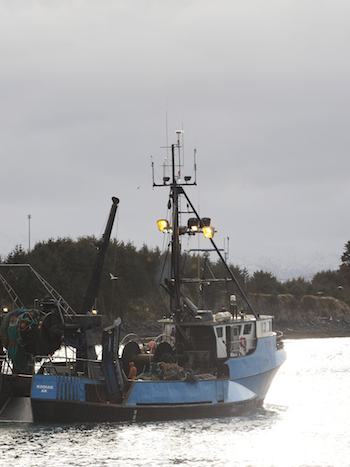We are finishing up our annual business plans here at our home office in Portland, Maine, which always gets us thinking overtime about sectors of growth and constriction in the fishing industry.
I can see points of hope in most parts of the country, along with the ever-present and dire need for more and better data. But what is typically the brightest spot — Alaska — is now engaged in a political maelstrom in Kodiak groundfish.
Kodiak trawlers fear consolidation if the North Pacific council enacts catch shares for local groundfish stocks. Cheryl Ess photoFor years, the North Pacific council has weighed the outcome of applying catch share quotas to the fleet — primarily trawlers, from midwater to bottom. Now as the state faces a steep decline in oil revenue, Gov. Bill Walker has praised the commercial fishing sector, the state’s largest private source of employment, and vowed to support the industry. Kodiak’s trawlers, however, feel unfairly targeted as a blighted gear type.
Walker appointee Sam Cotten, commissioner of the Alaska Department of Fish & Game, proposed an alternative that would divvy up bycatch quotas rather than catch quotas, which the trawlers have responded does little to eliminate the race to fish, a purported goal of catch shares.
In what is effectively a notation of the negative effects of quota management, the council’s discussion paper on the matter claims that its greatest challenge is protecting communities and fishermen from the effects of privatization, “notably excessive consolidation and concentration of fishing privileges, crew job loss, rising entry costs, absentee ownership of quota and high leasing fees, and the flight of fishing rights and wealth from fishery dependent communities.”
One wonders how a catch share system could be considered at all if these effects are anywhere on the list of the council’s concerns.
Another alternative would create community fishing associations — nonprofits to manage quota in community-based sectors — rather than divvying it up among the industry directly. The description does not sound dissimilar to the Northeast groundfish sectors under the region’s widely panned catch share program. I can’t say it won’t work, but I can say that I have yet to see a quota management system that has successfully sustained vibrant fishing communities.
A natural byproduct of quota management is consolidation. The same council meeting that weighed the alternatives for the Kodiak trawl fleet reviewed the 10-year anniversary of the Bering Sea/Aleutian Islands crab rationalization, which resulted in a nearly 70 percent fleet reduction in the first year alone.
What fishery managers and their federal overseers seem to be missing is that while consolidation might reduce the community’s power and economic stability, it does not make the fleet less powerful. When you put more money into fewer hands, you create more powerful fleet owners. Their power and money is more easily channeled into lobbying interests, and suddenly you have a fleet that can sway more legislation and decision making at higher levels.
Catch share management may appeal to those who believe that reducing effort will reduce the political power of fishing fleets, when in fact it does the opposite. If the North Pacific council and Walker are concerned with Alaska’s fishing communities, they will find a way to keep small-boat and community-based fleets thriving.







